This was the first episode where, for me, the Klingon scenes weren’t insufferable. Their speech finally sounded like language and actual communication rather than ceremonial correcting and positioning. It’s a too-common mistake made by shows set in cultures of deep hierarchy or honor, presenting life as if all talk is made of practiced pronouncements. I found it as recently as 2017, in Wonder Woman, plaguing the scenes set in Diana’s homeland of Themyscira, crippling my ability to enjoy that film. It always reads as terribly fake, and writers do their viewers favors by letting people be what we all know, deep down, that they all are—people.
One of the joys of this episode is that the real reigns well over the ceremonial, or proper.
If anyone forces you to go one mile, go with them two miles.
—Matthew 5:41
That’s is a big one with me, that verse. It’s one of the few in scripture that do what many think is all the Bible does: tell us how to behave. One of the ways I try to apply it is, in conversation, meeting people where they are, rather than assuming that they are, or implying that they should be, where I am. This might apply to Christian apologetics, for example. It’s pointless to list a bunch of scriptures to a non-believer, because…well, they’re not believers! Telling a person, “You may think you don’t believe in God, but that’s not true, because Romans 1:20 says…” is a pointless, and likely offensive, option. Those words have no credibility with them, save possibly to provide a source reference for what Christianity thinks.
The scripture doesn’t say, “If someone asks you to walk with them one mile, turn them toward your path, which is the right path, of course, and make them walk those miles. No good can come of that other path.” God has no fear of the other path, and as the owner of all truth, can easily navigate our friends from wherever they stand or move, so travel with them in trust.
I see that kind of wisdom illustrated by many characters in this episode. Look at Lorca’s leadership. He knows what drives Stamets: a complimentary thing, said as a matter of fact, “…we can’t stop them without the spore drive. Without you…You’re not just a scientist. You’re an explorer.”
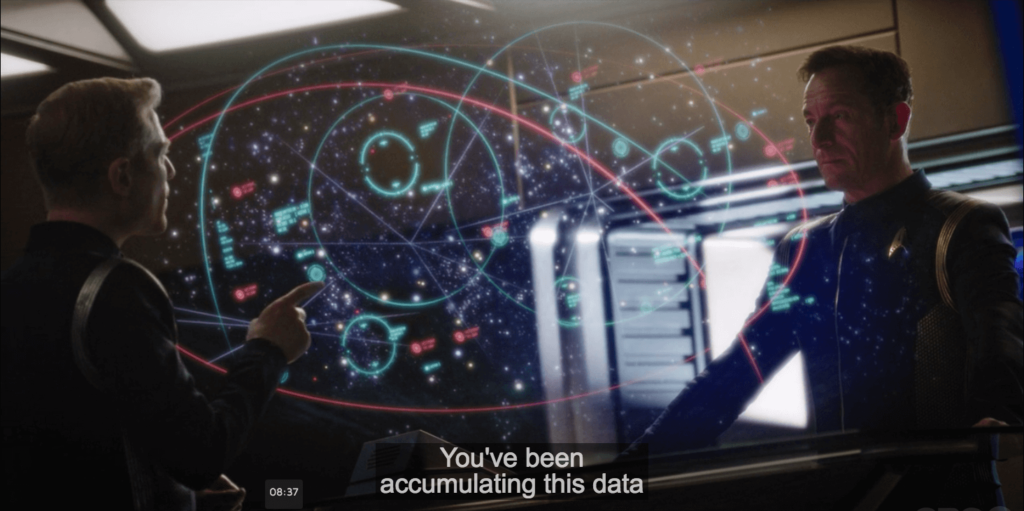
He shows Stamets a rewarding puzzle, acknowledges that what he is asking is a sacrifice, and then says, “We have to win this war…but, then…”
“Then the journey continues,” Stamets finishes, fully on board.
When Michael speaks to the Klingon commander, she makes a case the Klingons would understand. She starts from their perspective:
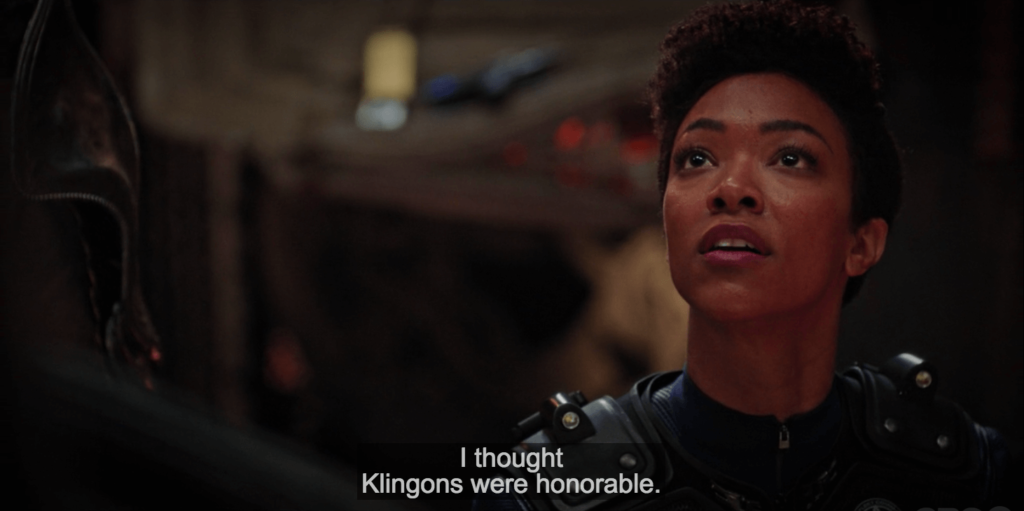
It works, buying her the time she needs.
Admiral Cornwell gets through to the traumatized Tyler by addressing him right where he is, mentally, and gradually pulling him out. As the story sits in this episode, the security chief is a very recent, Me Too survivor. She shows respect for his state:
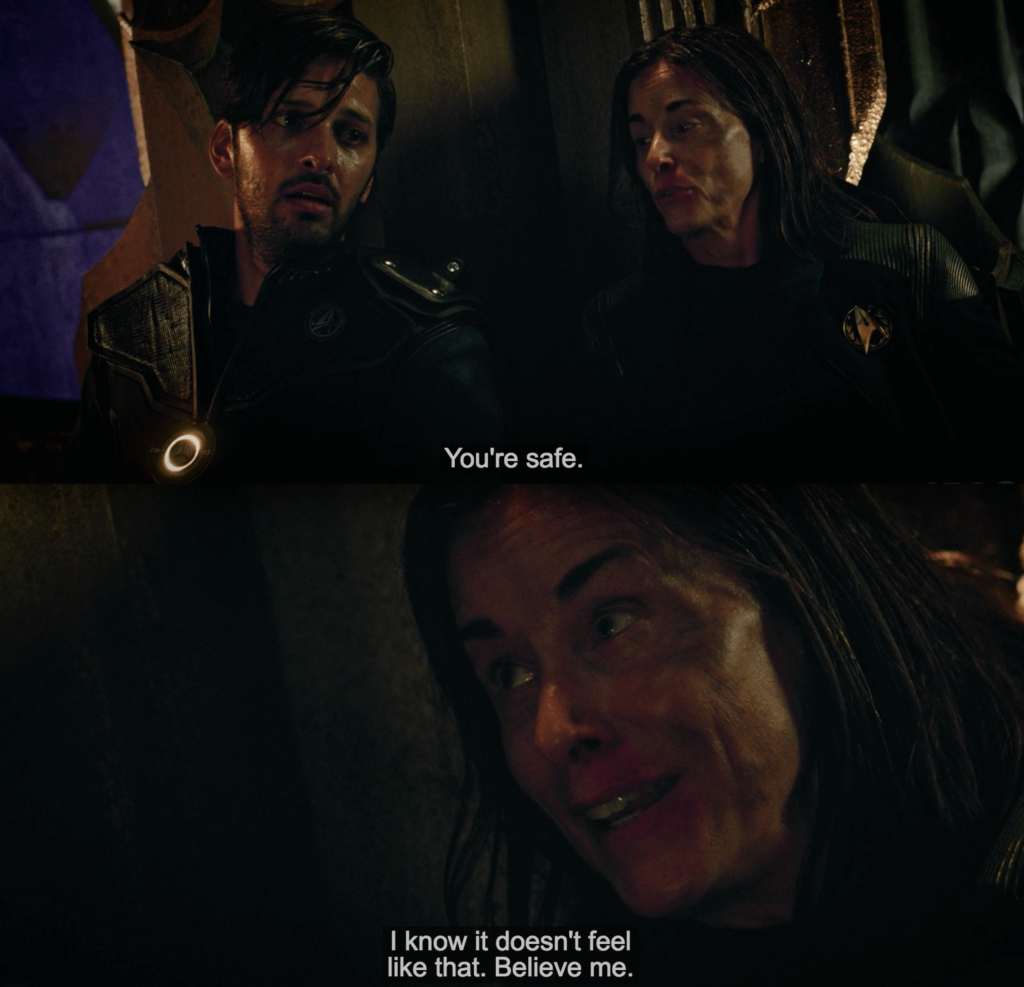
It takes time, but he comes around, right when circumstances press him to.
He did not say anything to them without using a parable. But when he was alone with his own disciples, he explained everything.
—Mark 4:34
This is another favorite of mine, laying waste the too common notion that Jesus taught everything in parables, that He was always unclear, leaving everything open to interpretation. Yes, He did that after a while, but not until He had spent a fair amount of his ministry being open, clear and direct about His identity, and what that meant. Explaining things has great value, in leadership, in relationships, in apologies—everywhere.
This episode shows the value of explaining rather than merely commanding, and explaining along with commanding. Look back at Lorca and Stamets. He needs his scientist to do a risky thing, so he makes a case for it; a darn good one.
When Michael disagrees with Lorca’s order that she not board the Klingon vessle, she makes a case, and a darn good one.
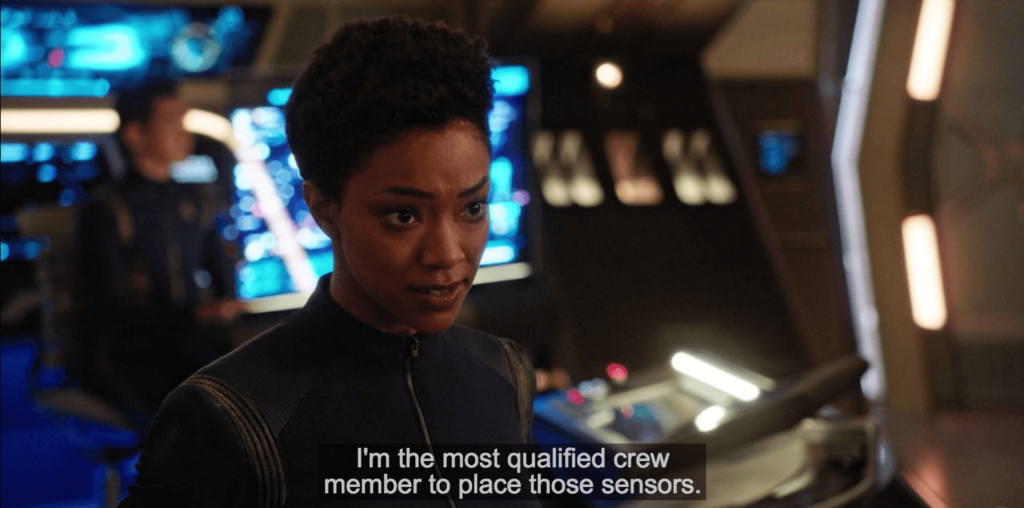
They get their way, not by being rhetorically clever, but by legitimately convincing the other.
Lorca makes an announcement to the crew too, explaining what they are about to do, and why – to end their war.
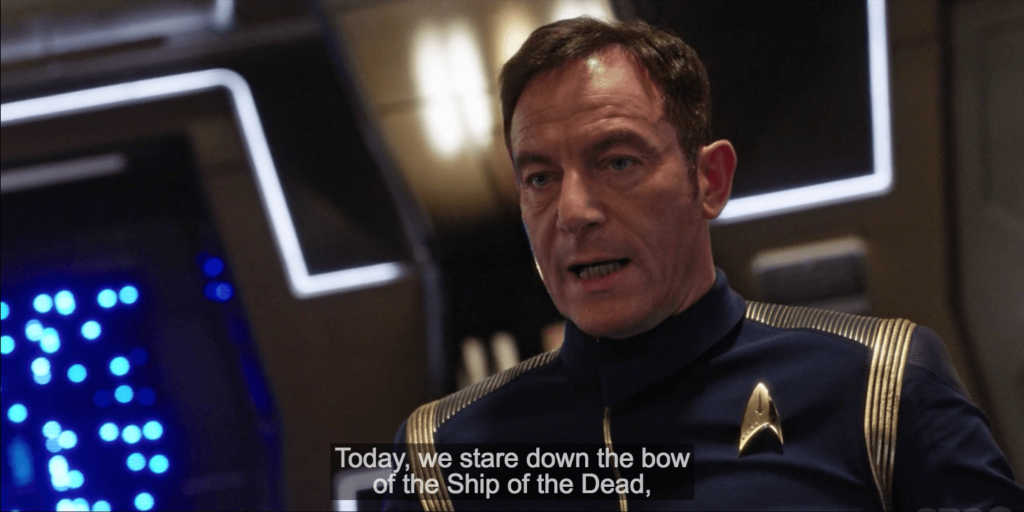
Everyone is on board after that. You can see it in the expressions they share.
The show ‘explains’ visually as well. We always know what’s going on, and why it matters—the countdown of jumps, what people are doing with their locations; it has enough plot for twice the running time of the episode, but it is not merely fast. It’s satisfyingly efficient.
Look, Jesus explained things, a lot of things, most of them pretty clearly too. Our God does more than decree; he explains why. He invites questions. He gave Moses two stone tablets. Us? He wrote us a book!
TRUST
Trust is the primary definition of what Christians mean by ‘faith’. It is not a word for a leap in the intellectual dark, but one for a trust in the character of the One who has us in His hands all the time.
Explaining leads to trust. It is a full showing of the cards in hand, an indication of nothing to hide, a full reveal of the map.
The Captain makes a decision not to flee a seemingly lost battle based on thinking like the Klingon captain.
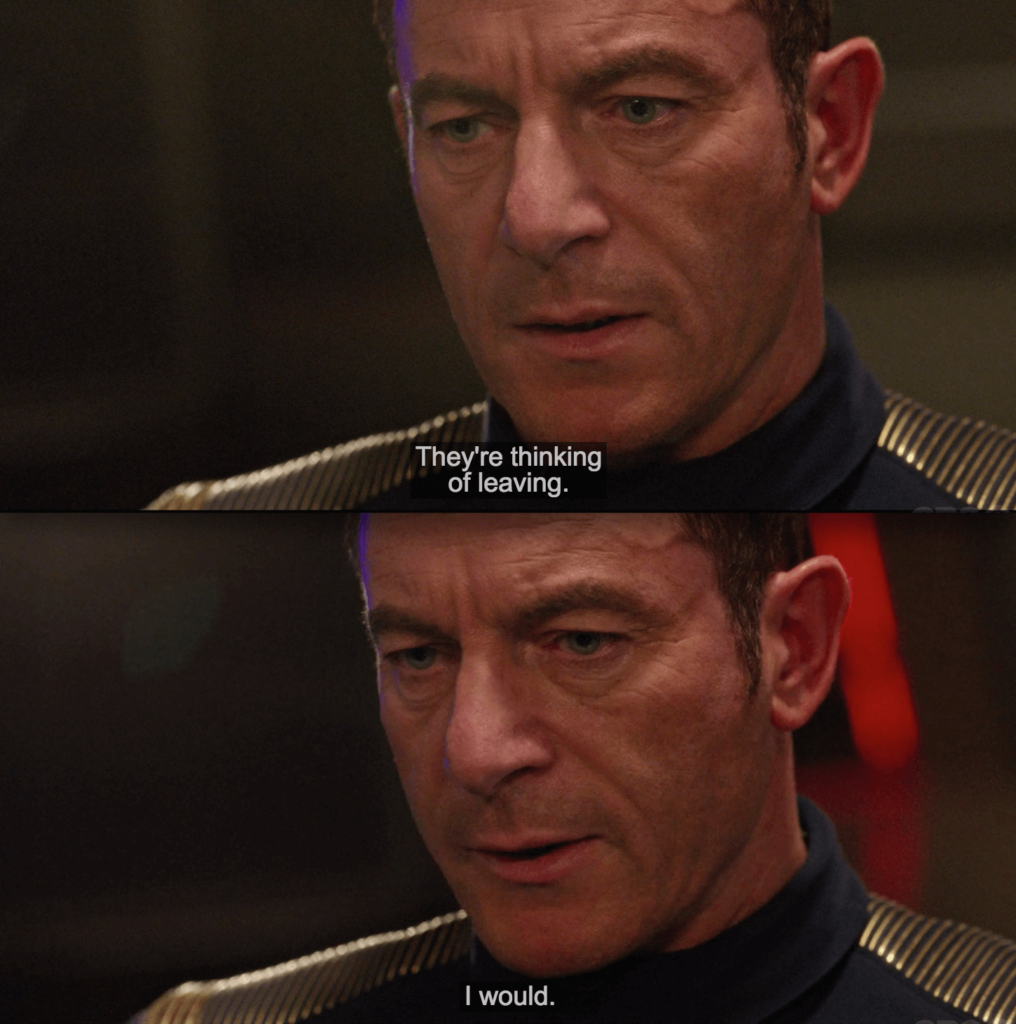
To win a battle, you go where the opponent is (this may have much to do with Jesus’ incarnation). Lorca trusts this intuition because he has enough information to do so.
Burnham trusts when she jumps on the Klingon bridge – a trust fall. It comes from knowing her crew – not just that they will transport her, but when they will, exactly, from knowing how they work and the nuances of their timing.
The climax of this episode satisfyingly comes almost 1/3 of the way before the ending—there’s more story to come. True story structure doesn’t rush to a “The End” card once the Death Star blows up. Good stories have a denouement. There is a crucifixion, but then comes a resurrection, and many, many visits. There is death, then heaven. Happily Ever After is not always the mere bromide it can be. Sometimes it represents the eternity to follow the fall and rescue. We have ramifications to deal with.
Should success validate?
Captain Lorca broke ranks, just like Michael did in episode two, but he succeeded. His disobedience is called ‘unorthodox methods’, not insubordination. Like Captain Georgiou earlier, until he gives solid reasons to do so, he will not be identified as a villain, but a hero.
Playing into that, Lorca moves his medal to where it belongs: Stamets, the one who sacrificed the most. They need to get home, and Stamets offers one final, painful jump. “I would never ask that of you,” Lorca says. So Stamets offers to, for the safety of the others, and Lorca thanks him.
Star Trek has not always told multiple stories well, so it’s nice to see an episode handle the wrap-up of at least four of them so well. The final costs on Stamets were the story’s only major misstep. It’s too on the nose for the final offered jump to be the one with all the harm, something done with the hard hand of show-runner manipulation. Otherwise, this was one of the series’ best episodes…though the actual best is still ahead.
• • •
Trektember is an annual series about Star Trek; this year, we’re examining the first seasons of Star Trek: Discovery and The Orville. For more information on this series, click here; or, to read every article from the beginning, click here!


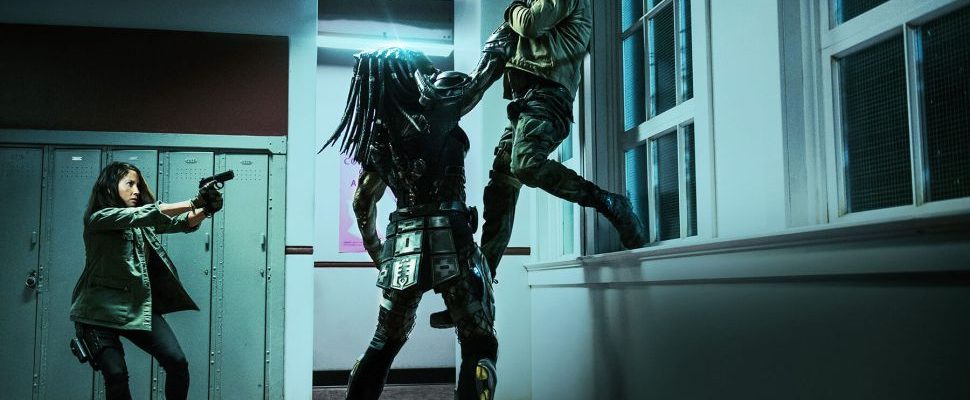
2 comments